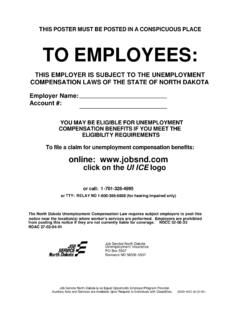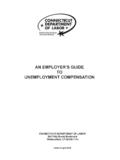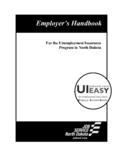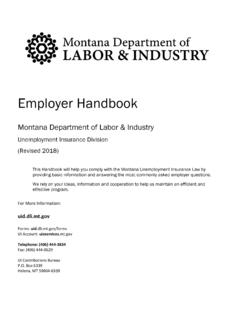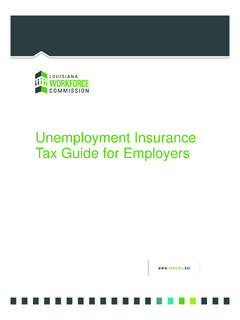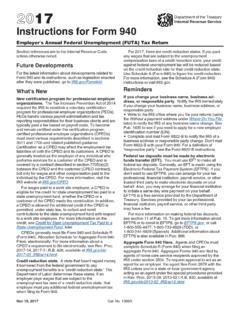Transcription of California Employer Recordkeeping Requirements
1 Provided By ISU-ERM Insurance Brokers Employer Recordkeeping Requirements Federal laws, such as the Federal Insurance Contribution Act, the Fair Labor Standards Act (FLSA), the Equal Pay Act and the Civil Rights Act, impose Recordkeeping duties on employers . Recordkeeping duties include creating, updating and preserving information. California law also imposes several Recordkeeping Requirements on employers that operate, in addition to or in conjunction with, federal Requirements . The summary below provides an overview of state Recordkeeping Requirements for employers in general. Recordkeeping Requirements . Employment Law Recordkeeping Requirement Area Personnel Records employers must maintain personnel records for at least three years after separation from employment at the location where employees report for work, or at another location agreeable to the Employer and those authorized to review or inspect them.
2 Employees have the right (or can authorize another) to inspect their own records. Inspection requests must be in writing. employers must make these records available to the employee within 30 days. employers that fail to keep records or make them available for inspection may have to pay fines of up to $1,000 per violation. Impossibility of performance, not caused or resulting from the Employer 's own fault or violation of law, is an acceptable defense. No Employer will be required to comply with more than 50 record inspection requests within one calendar month. Personnel Record The Requirements mentioned above do not apply to: Exceptions Records relating to the investigation of a possible criminal offense;. Letters of reference;. Ratings, reports or other records obtained prior to the worker's employment, prepared by identifiable examination committee members or in connection with a promotional examination.
3 Employees working for an agency subject to the Information Practices Act; and Employees covered by a valid collective bargaining agreement that prescribes (1) the wages, hours of work and working conditions for employees, (2) a procedure for the This guide is not intended to be inspection and copying of personnel records, (3) premium exhaustive nor should any discussion or opinions be wage rates for all overtime hours worked, and (4) a regular construed as legal advice. It is rate of pay of at least 30 percent higher than the state provided for general minimum wage rate. informational purposes only. It broadly summarizes state statutes and regulations generally applicable to private employers , but does not include references to other legal resources unless specifically noted. Readers should contact legal counsel for legal advice. 2013 Zywave, Inc. All rights reserved.
4 JPA 04/13. Employer Recordkeeping Requirements Employment Law Area Recordkeeping Requirement Payroll and Earnings Most employers are required to create and maintain employee payroll Statement records for at least three years at the place of employment or at a central location within the state. Each employee payroll record must include: The employee's name and address;. Proof of the employee's age (if a minor);. Gross wages earned;. Total hours worked by the employee (unless an exception applies a fixed salary or overtime exemption);. The number of piece-rate units completed and any applicable piece wage rate if the employee is paid on a piece-rate basis;. All deductions (they can be aggregated and shown as one item);. Net wages earned;. The inclusive dates of the period for which the employee is paid;. The employee's name and his or her identification number (or the last four of the Social Security number if employees are not assigned an employee number).
5 The Employer 's name and address (and the legal entity that secured the services of the Employer if the Employer is a farm labor contractor); and All hourly rates that apply to each employee during each pay period. employers that fail to keep these records may be required to pay any damages that result from a Division of Labor Standards Enforcement (DLSE) investigation, a fine equal to $250 per infraction ($1,000 for subsequent infractions), court costs and reasonable attorney's fees. Each employee file that is not in compliance is a separate infraction. The DLSE. has the discretion to not penalize an Employer for a first violation caused by a clerical error or inadvertent mistake. Temporary Service Effective July 1, 2013, temporary service employers must also keep record employers of the rate of pay and the total hours each employee works for a temporary service assignment.
6 Tips and Gratuities employers must keep accurate records of all gratuities received by their employees, regardless of whether they receive the gratuities directly or indirectly. Equal Pay employers must maintain sufficient records to prove to the DLSE that they pay similar wage rates to employees that perform work that requires similar levels of skill, effort and responsibility under similar working conditions. If there is a variation in wage rates, the records must justify a difference based on seniority, merit, performance (quality or quantity of production). or any other system that takes into account bona fide factors other than sex. If an investigation ensues and an Employer fails to furnish adequate records, it may be required to pay back wages, interest on back wages, court costs, attorney's fees and damages (usually an amount equal to back wages). California law requires employers to keep these records for at least two years.
7 2. Employer Recordkeeping Requirements Employment Law Area Recordkeeping Requirement Child Labor employers must keep record of the safety training they provide to minors for the operation of tractors and machinery. Safety training records must be part of each minor's personnel file. In addition, personnel files for minors must identify the name of the minor and contain copies of any certificates or documents authorizing the minor to work for the Employer . Unemployment The California Employment Development Department (CEDD) requires compensation employers to keep true and accurate record of any information it may need to assess individual eligibility for benefits, including records to show each employee's status (employed, on layoff, on leave) and wages. If an Employer fails to keep and furnish the records required, the CEDD will assume that the employee is entitled to receive the maximum benefit payable under the law and the Employer 's account will be charged accordingly.
8 When a claimant worked for more than one Employer , additional assessments will be charged only to those employers that fail to keep or furnish adequate records. Working with Contractors employers must keep record of contractor agreements in the construction, farm labor, garment, janitorial, security guard or warehouse industries for at least four years. The records must prove that, at the time of contract, employers had sufficient funds to allow the contractors to comply with all applicable local, state and federal laws. Specifically, the record must include: The Employer 's name, address, telephone number and identification number;. The contractor's name, address and telephone number;. The contractor's workers' compensation insurance policy number and the name, address and telephone number of its insurance carrier;. A description of services the contractor will provide (including beginning and completion dates).
9 The amount of commission or other payment made to the contractor for services rendered under the contract;. The total number of workers to be employed under the contract, and the total amount of all wages to be paid and pay dates;. The address of any real property that will be used to house workers in connection with the contract of service;. The vehicle identification number of any vehicle the contractor will use in connection with the services it will provide to the Employer ;. The number of the vehicle liability insurance policy that covers the vehicles mentioned above and the name, address and telephone number of the insurance carrier;. A list of any independent contractors the contractor may hire to provide its services to the Employer along with the independent contractor's local, state and federal license identification numbers (if applicable); and The signature of all the parties to the contract and the date the contract was signed.
10 3. Employer Recordkeeping Requirements Employment Law Area Recordkeeping Requirement Workers' compensation The Division of Workers' compensation (DWC) requires all employers to In General record and report every occupational injury or illness that causes an employee to seek medical treatment beyond first aid or lose working time beyond the date of the injury or illness. Each record must include, among other things, the injured employee's Social Security number. Any person who makes a false statement or certification on records or other documents required under the Cal/OSHA program is subject to a fine of up to $70,000, imprisonment of up to six months or both. Workers' compensation The DWC requires self-insured employers to record and report: Self-Insured employers The amount of all compensation claims;. The amount of benefits paid to date;. An estimated amount of future liability on open claims under state and federal laws.
